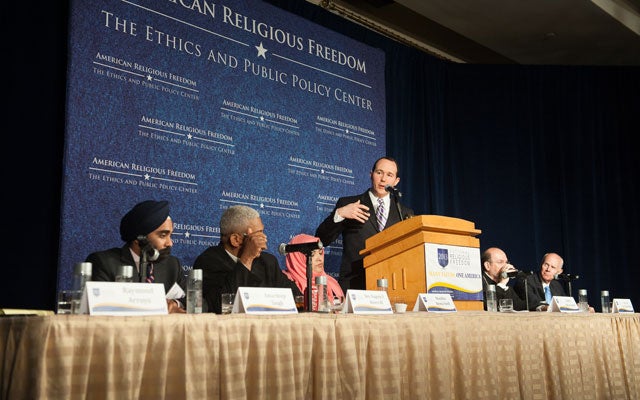One Thing All Faiths Agree On: Religious Liberty
David Azerrad /
A Jew, a Catholic, and a Protestant—but also a Muslim, a Mormon, a Sikh, and an Orthodox Christian—walk into, not a bar, but a religious freedom conference where they all sit on a panel entitled “Many Faiths, One America.”
And here’s the punchline: they all agree. Not, of course, on doctrinal issues, but on the centrality of religious liberty to the American regime and on the pressing need for a united front to address growing threats to it.
Such a harmonious display of interfaith diversity really does confirm the extraordinary capacity of liberalism to bring people together and help them transcend their differences.
The left, of course, promises to do this through noble rhetoric and community-building initiatives—not through an aggressive secular agenda aimed at purging religion from the public square. But given the hard times that have befallen the Obama Administration, liberalism should chalk this up as a victory and a testimony to its dedication to diversity and pluralism.
All jokes aside, the conference did highlight one important strategic point: Any approach to defending religious liberty must be solidly anchored in the principles of the founding.
Americans of all faiths should not accept the premise of an omnipotent state that doles out favors to various organized interests. This not only encourages factionalism, but it makes religious liberty the exception, rather than the rule.
“We need to reverse the paradigm,” explained Hannah Smith, Senior Counsel at The Becket Fund for Religious Liberty. “We are now fighting for exemptions, but in the Constitution, the protection of religious liberty comes first—accomodations come later.”
Or as George Washington put it in his famous letter to the Hebrew Congregation of Newport, Rhode Island:
It is now no more that toleration is spoken of, as if it was by the indulgence of one class of people, that another enjoyed the exercise of their inherent natural rights.
In America, we don’t go groveling before the state, begging for scraps of liberty here and there. Rather, we begin with the presumption of a God-given inalienable right to liberty and, like our forefathers who signed the Declaration of Independence, oppose “with manly firmness [any] invasions on the rights of the people.”

